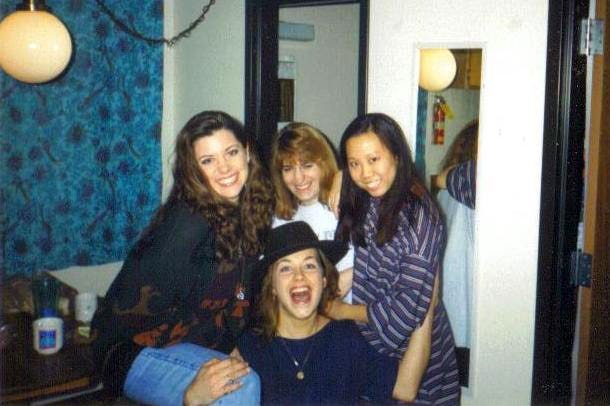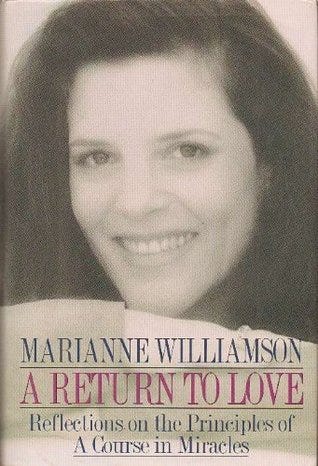A book on a shelf can be a dangerous thing. You might read it. You might, then, decide to share it. And it might change your life, or it that’s too dramatic, it might illuminate a corner of your mind that was previously uncharted.
The self-help genre did that for me. When I reflect, at fifty, my interest in self-development is the habit that has had the most significant impact. It’s where I don’t have regrets, and as anyone in midlife and beyond will tell you, regrets grow in ugly abundance the older you get.
But they’re the kind of books that make some people cringe and roll their eyes. When I was in my 20s, I handed a hard copy of A Return to Love by
to my older friend Fran, she returned it right away.“Sorry, it’s not for me.”
“Oh,” I was taken aback, full of naivety, “Did you read it?”
“No, I looked at the first page, and then closed the book!”
I was gutted. That book was my gateway into the genre. It took my eclectic background in Christianity and Buddhism, childhood fears and loss, and created a comfort blanket of sorts, but most of all, it taught me practical lessons in forgiveness and love.
For example, as a young woman, I needed to hear from Williamson, “There’s room for all of us to be a beautiful”. That was fucking revolutionizing. I had always felt instinctive competitiveness when I was around other women. Who was skinnier, taller, and the most attractive? But the idea that we all can be beautiful? Who teaches this? Women’s magazines? But once I allowed those words, “There’s room for all of us to be a beautiful” to sink in, I relaxed, and fell into my natural state of being supportive, goofy, and vivacious around other women, especially folks I had just met or hardly knew.
Like many, I had survived childhood, but I had none of the tools to help me make sense it. I was angry, hurt, and raw, but thought I was okay. Nowadays, my upbringing would be considered abusive, but back then, that was just the way it was. After showing up with a shiner, my high school’s counselor’s suggested getting the police involved, but that just made me feel sad and hopeless because I knew it would do no good. I pictured my Thai immigrant mom and her young Army boyfriend and me sitting awkwardly in the living room, none of us saying anything until the police had left.
High school psychology class was a good start. I had fallen in love with reading, so that was good. But religion felt like something forced upon me, or at least something that I didn’t chose, and it didn’t help me navigate life in a meaningful way. Lessons from the Bible felt ancient and my exposure to Buddhism involved rituals centering on good luck. They did, however, pique my interest in spiritual and religious matters.
When I went off to college, I discovered my inner hippie, like full-frontal New Age, happy baby yoga shit. To be crystal clear, I wasn’t a crunchy granola who drove a fuel-friendly SUV, or a patchouli-laced Earth goddess with a killer jewelry collection. No, I was a card-carrying tarot addict, but I had to give all the decks away (but one) when I realized I couldn’t make a decision without consulting the oracle first.
But I also did a deep dive into self-help literature, which one inevitably finds in shops with sage bundles, prisms, and wind chimes.

It was my friend Sara who first turned me on to Marianne Williamson’s A Return to Love during what would turn out to be an epic road trip from Durango, Colorado to Tusin, California. But before we hit the pavement, Sara told us to pause the audiobook at any time. She encouraged us to ask questions and share anything that came up for us. Thus solidifying for me the power of girlfriends communing, crying, and laughing our way to inner freedom on the open road.
When I returned home from college, my mom’s Army boyfriend and I got into an ugly fight in front of the family. I don’t remember what set us off—what set me off because he never raised his voice. The clue is in my question, and in the context of daughter comes home after years away.
“Why did you treat me the way that you did?”
His response punched above my weight class, “I wanted you to hate me.”
I wanted to scream back, “Well, I do! Bravo, asshole.”
Instead, I steadied myself from the shock and anger, and said, “I don’t hate you.” Then I walked into my room, closed the door, and recognized in that moment that something significant happened. While I couldn’t bring myself to say, “I love you," or forgive him, that would take many more years, I made a choice that felt like a mature and new direction.
Throughout my 20s and 30s, I continued to read and listen to self-development books, often re-reading and re-listening to my favorites. I needed constant reminders to let go of overthinking, to treat myself kindly, and to not to be a dickhead to others. For me, self-help took the best from world religions and philosophies and turned them into practical and substantial practices that helped me deal with life’s bitterness and blows with strength and dignity.
Although, after a certain point, I felt I had over-saturated myself with the same material. The messages had landed already. I wanted to move on. It was a fond farewell, but like an old friend, I don’t think I realized how much it transformed my outlook on life. And over time, I returned to similar content and started to explore Stoicism, Zen, and mindfulness meditations because, honestly, are we ever finished with self-growth?
There was a time in my 40s when I realized I didn’t have any of society’s benchmarks of success like a husband, a house, cute kids, or even a car, let alone, everyone’s favorite – money. I’m a semi-nomadic outsider who, for better or worse, has chosen a life of freedom and creativity outside the boundaries of her passport country.
This can sound romantic, but any lifestyle is not without it’s challenges, it’s pros and cons. I’m just as vulnerable to replaying my top regrets playlist as anyone else. But as the world we envisioned becomes more dystopian rather than utopian, I’m glad that I didn’t chase the shiny coins or life’s distractions. This might not make much sense, but it feels future-forward and what humanity should have been pursuing. Because if we had valued self-development over a self-serving mindset, I’d argue we’d be living in a very different world.

Instead, self-improvement is regarded with cynicism, as homeopathy bullshit. To be sure, there are the costly cults, the Osho charlatans, and Pollyanna on overdrive, but those are the extremes. Go at it cautiously, if that’s your vibe, but there’s no need to put Baby in the corner, or throw out perfectly good bathwater.
That’s the thing about genre, there’s something for everyone. There’s also something powerful about telling yourself, I am willing to change and grow, and that maybe repurposed Indian, Greek, and Japanese philosophies and religions have something to teach me. Because I don’t have all the answers, because I need a little help, and isn’t that a relief to admit?
Look, my what-ifs haven’t totally receded. I can’t tell if face yoga is working, nor have I attained mountain-top or mid-level enlightenment. In fact, My Choose Your Own Adventure no longer looks like a promising first draft, but a series of mistakes and missed opportunities. At 50, I found myself “between jobs”. I’m a first-generation American who isn’t even living in America. How did I get that wrong? But the strangest thing is, whenever I compare myself to other people—there’s no one else I’d rather be than me.







This was fantastic Lani. An incredible story, so well told. It's funny reading such an honest and introspective piece from a 50 year old - I am 26 and feel myself asking big questions all the time, trying my best not to create too many regrets.
To your point about the taboo-ness of self-help - I've enjoyed reading them for years now, and always encourage my brother to do so. Every single time, it's not just met with a "No thanks," but more of an opportunity for him to remind me how much he DOESN'T need them... it's very funny. I think many people view them as a sign of weakness perhaps. Ironically, you could make the argument that they are precisely the people who need it!
Anywho, I'm rambling. A great post, I'm subscribing to read the next ones!
Loved everything about this Lani! Your insight, your language, your storytelling hit all the right notes for me, a bonafide self-help/personal growth junkie!! One of my favorite teachers was Wayne Dyer who said “when you change the way you look at things, the things you look at change”. With the share of your step-father’s story, change you did!!